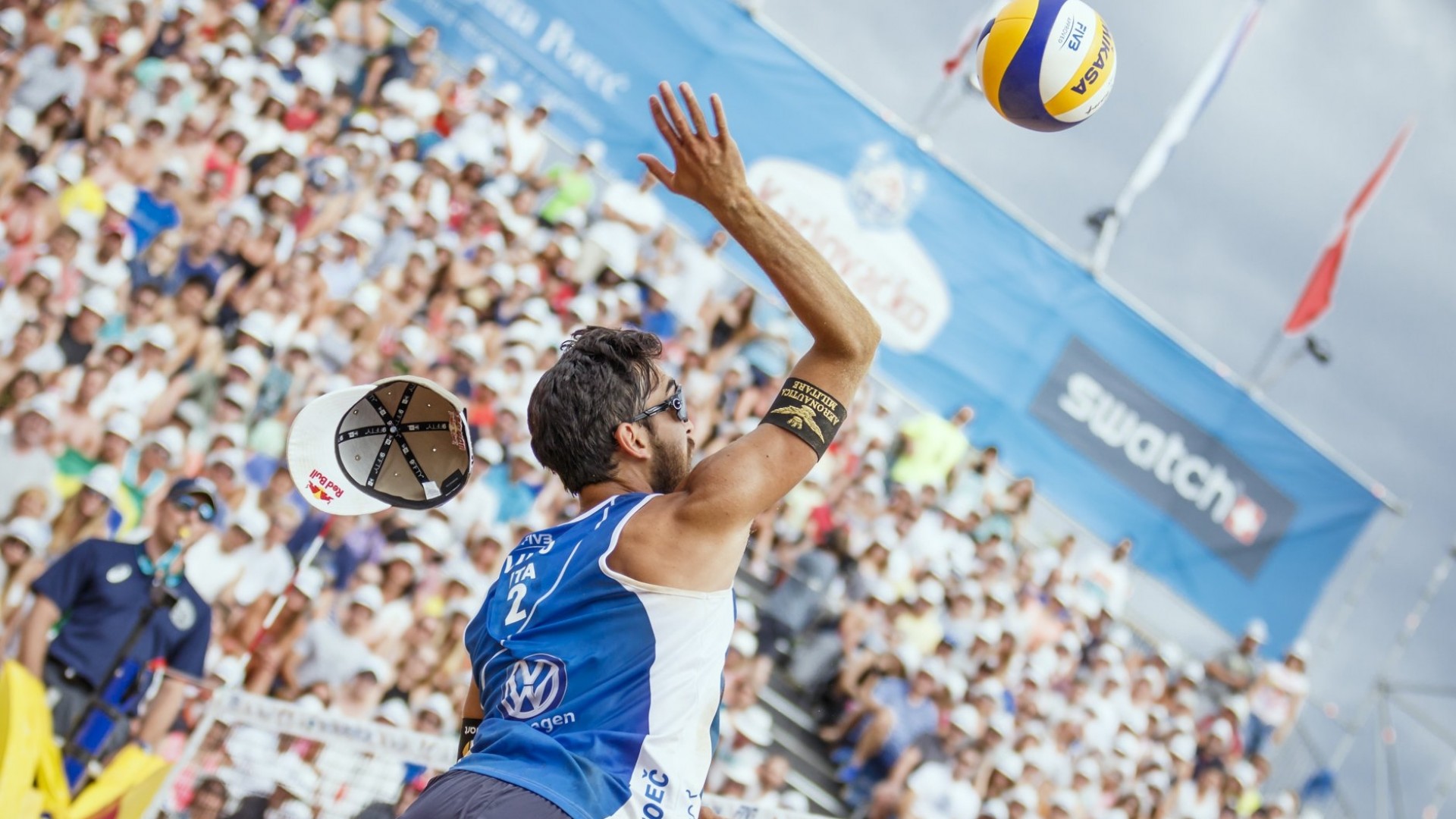The history of beach volleyball


We are happy and proud to be part of this success story since 2015 and to be able to create goosebumps moments for players and fans with the most spectacular beach volleyball action, unique locations, and breathtaking photo shoots in person and via our digital channels.
In 1915, George David Center and his friends played volleyball on sand for the first time. He set up a net on Waikiki Beach in Hawaii and encouraged his colleagues to play a game of six-a-side. Seven years later, the Santa Monica Beach Club was founded and in 1927 five more clubs followed, making Southern California the birthplace of beach volleyball.
The new sport reached the “old world” in 1927. Nudists from a Parisian suburb acted as pioneers and beach volleyball was first played in a colony in Frankonville. In the 1930s, the first beach volleyball matches were played in Prague, Riga and Sofia. In 1947, the first tournament was organized. A year later, in 1948, the winner received his first “ prize money” - a six-pack of Pepsi.
In the early 1950s, the first series of tournaments consisting of five individual tournaments was created. The connection between sport, entertainment, sex appeal and the emerging marketing trend became ever stronger - “Beachmania” was born.
The increasingly numerous beach volleyball events quickly developed into huge parties. Although it aimed to maintain the fun factor, the California Beach Volleyball Association soon published its first regulations in 1965. This standardization of rules and set-up was necessary to ensure the quality of the growing number of tournaments.
In 1974, the first sponsored tournament took place. The Winston Company invested USD 1,500, which was used to pay the prize money for a tournament in San Diego. The 1976 Olympic Beer Championships in State Beach attracted 30,000 spectators, and this tournament is still considered the origin of the event concept for the sport of beach volleyball.
The most important element in any sport is the athletes. In the early 1980s, however, some promoters seemed to ignore this. This resulted in poorly organized tournaments and a neglect of the players' needs and suggestions. Therefore, the Association of Volleyball Professionals (AVP) was founded in 1983. In 1985, this “volleyball union” began organizing its own tours with prize money of USD 275,000.
In the mid-1980s, more and more non-American teams took part in AVP tournaments - with beach stars from Brazil in particular trying to gain a foothold in the US domain. In 1987, the international volleyball federation FIVB founded the World Tour and offered a platform to play at the highest level at professionally organized events around the globe. Differing regulations and battles over broadcasting time and sponsorship money led to a deep conflict between the FIVB and the AVP, which ended in mutual bans for the players.
Beach volleyball made its breakthrough in 1992 in Almeria (Spain), where a demonstration tournament was held as a counterpart to the Olympic Games. The great interest led to it being nominated as an Olympic discipline at the 1996 Games in Atlanta.
The number of international tournaments, which took place on five continents, increased dramatically in the mid-1990s, as did the prize money. The first Olympic beach volleyball gold medals went to the United States, Karch Kiraly and Kent Steffes in the men's event, and Jackie Silva and Sandra Pires from Brazil in the women's event.
The first official Beach Volleyball World Championships took place in 1997. At that time, the sport was dominated by some brilliant Brazilians. Para/Guilherme won the men's event and Silva/Pires won the women's final. The World Championships led to a real international match between the USA and Brazil, as both the men's and women's teams had four teams in the top eight.
Just in time for the new millennium, the second Olympic beach volleyball championship took place against the breathtaking backdrop of Sydney. At that time, beach volleyball was already in second place in the category of “most popular” Olympic disciplines.
The success story continued with the 2004 Olympic Games in Athens, 2008 in Beijing and 2012 in London. Not only did the competition level of the sport rise steadily, but the popularity of beach volleyball also increased. At the 2012 Games in London, tickets for the beach volleyball tournament were among the most popular and the games took place in front of packed crowds at Horse Guards Parade.
The Beach Volleyball Major Series, a joint venture between Red Bull and ACTS, supported by the FIVB as the governing body, was launched with the aim of creating a new series for the best athletes in the world and an unforgettable experience for fans. In its debut season in 2015, the Beach Major Series included tour stops in Croatia, Norway and Switzerland before the first World Tour Finals were held in Fort Lauderdale.
In 2016, the Olympic Games took place on the legendary Copacabana beach and the packed stands there whipped the Brazilian team Alison/Bruno to gold in the men's competition. But Europe was also able to celebrate, as the German women Ludwig/Walkenhorst took first place on the podium. The Beach Major Series was also expanded - stops in Klagenfurt and Hamburg were added to the tournament program. The curtain came down on a fantastic season at the World Tour Finals in front of a full house. Alison/Bruno and Ludwig/Walkenhorst won gold again to round off an unforgettable year.
The 2017 season was dominated by the magnificent World Championships in Vienna, Austria, where almost 200,000 spectators witnessed what was arguably the biggest beach volleyball tournament in the history of the sport to date. Although the gold medals went to Brazil's Evandro and Andre and Germany's Ludwig and Walkenhorst, local heroes Clemens Doppler and Alex Horst were the undisputed heroes of the tournament with their silver medal win.
2018 saw a generational change on the world stage. In particular, the young Norwegians Anders Mol and Christian Sørum made history with their victory in Gstaad as the youngest winners of a Beach Major Series tournament. The pair went on to win the European Championship title, took Major gold twice in a row in Vienna and secured the final title of the season in Hamburg. The 20-year-old Duda also entered the history books and became the youngest winner of a World Tour Final when she won with Agatha in Hamburg.
In 2019, the World Championships in Hamburg broke all German records for spectator numbers with 130,000 spectators and the Red Bull Beach Arena was transformed into a madhouse. While many long-standing teams split up and regrouped for the 2019 Olympic Games, the young “wild ones” seized their chance - in addition to Mol/Sørum, Clemens Wickler and Julius Thole from Germany stood out, as did the newly crowned Russian world champions Krassilnikow/Stojanowski.
At the 2021 Olympic Games, beach volleyball once again proved to be an absolute spectator favorite. In 2022, the Norwegians once again dominated the world stage and secured their first world title at the World Championships in Rome. Together with their compatriots Berntsen/Mol, they also won the first A1 CEV BeachVolley Nations Cup in Vienna. A new format was introduced at this tournament, in which eight European nations competed for the trophy. Each nation was represented by four players per gender category.
The 2023 season continued to be dominated by youth, with Swedish youngsters Åhman/Hellvig in particular making a name for themselves. After topping the podium at the European Championships in Munich the year before, they took the title again at the A1 CEV EuroBeachVolley Vienna 2023. Shortly afterwards, they also took the silver medal at the World Championships in Tlaxcala, Mexico. Gold went to the Czech surprise duo Perušič/Schweiner, the first Czech team to make it this far in this competition. Åhman/Hellvig also won gold medals at the Elite16 tournaments in Tepic, Hamburg and João Pessoa, at the King of the Court tournament in Rotterdam and at the World Championships in Doha. No wonder the pair quickly rose to number two in the world, just behind their Scandinavian rivals Mol/Sørum.
In the women's event, Duda continued to show off her skills with her new partner Ana Patrícia, with whom she won the 2022 World Championships. In 2023, they stood on the international podium no fewer than nine times: bronze at the Elite16 in Uberlândia and at the World Final in Doha, silver at the Elite16 in Tepic and at the World Championships, and gold at the Elite16 events in Ostrava, Gstaad, Hamburg, Paris and João Pessoa. These successes rightly earned them first place in the world rankings.


